- Home
- Paul Fraser Collard
The Lost Outlaw Page 3
The Lost Outlaw Read online
Page 3
The man in the corner seat watched the boy – he could not think of him as anything else – as he approached a diner attacking half a cooked chicken with his pocketknife. He judged the lad to still be in his teens, and certainly well short of his twentieth birthday. It was rare to see a boy of his age. Most had left to join the Confederate forces that were fighting the armies of the Northern states.
He had heard tales of lads as young as eleven or twelve joining up, despite the age of enlistment being eighteen. He smiled as he remembered a pair of underage twins in the regiment in which he had served who had found a cunning way to enlist without lying. The boys, aged sixteen, had put a slip of paper into their boots on which they had written the number 18. When questioned about their age, they had been able to truthfully reply that they were ‘over eighteen’. His smile faded. One of the twins had been killed crossing the city of Baltimore before the first battle in the War Between the States had even been fought. His death had meant nothing; had achieved nothing. He did not know what had become of the second twin, their parting coming on the battlefield as their battered regiment had begun a long and hazardous retreat back to Washington.
‘Excuse me for interrupting your food, sir,’ the lad said to the man tucking into his chicken dinner, ‘but do you know the way to Shreveport?’
The man, a heavily bearded fellow in a red checked shirt with gravy stuck to his whiskers, scowled at the interruption to his meal and shoved a great chunk of chicken flesh into his mouth in lieu of a reply.
‘I’m sorry to disturb you and all, but we’re looking for our father. My sister and I, well, we heard he was there. We need to find him. You see, our mother, she passed and he doesn’t know. We need to find him so we can tell him.’
The man looked the boy straight in the eye. ‘It’s north of here,’ he mumbled, spitting out a morsel of chicken, which became caught in his beard where it enjoyed a reunion with a large dollop of gravy. ‘Fair way aways, though.’ He rammed another hunk of chicken into his mouth. ‘If you head north, you’ll find it easy enough. Plenty of folk know the way to Shreveport.’
‘Thank you kindly, sir.’ The boy held his hat across his belly, nodded his thanks, then turned and walked back to take a seat opposite his sister.
The man in the corner seat had seen enough. He would not stay to see how the game played out. For that was what he knew it was, a game, one in which only the young couple claiming to be brother and sister knew the rules. He pushed away his plate and gathered his weapons. He was about to rise when he saw the girl whisper again to her brother before she got to her feet and walked towards his table.
‘Excuse me, sir. Do you mind if I ask you something before you leave?’ She came to stand opposite him, her hands slipping on to the back of the empty chair on that side of the table.
The man in the corner seat paused. He was in no rush. He could wait to see what happened next.
‘My brother and I, we were wondering . . .’ She paused to fix him with a pair of wide eyes. ‘Are you a serving man? Are you with the army?’
The man wondered why she felt the need to repeat the question. Did he look stupid to her young eyes? He did not answer immediately, though it was hard not to. The girl looked as if butter wouldn’t melt in her mouth. She was older than her supposed brother, perhaps in her early twenties. She had darker skin than he had first noticed, as if she spent a lot of time outside. Her eyes were brown, the whites clear and bright.
‘Are you a soldier, sir?’ She repeated the question.
‘Yes.’ He spoke for the first time.
‘I thought so. And if I’m not mistaken, that’s the uniform of an officer. Am I right?’
The man let the words pass him by. They were a preamble, nothing more. He would have to wait a while for the real question, though he was certain even that question would disguise the reason for the pair’s presence in the room. He kept a weather eye on the girl’s brother, who was watching the exchange closely. He noticed the way the boy’s hand hovered near the revolver he wore on his hip. It was a Navy Colt, he could see that much, similar to the one in his own holster. The lad was ready for trouble, maybe even expecting it. Maybe even hoping for it.
‘Have you been fighting them Yankees, sir?’ The girl pushed for his attention.
‘I have.’ He answered evenly. It was almost the truth.
‘Why, sir, you are so brave.’ She eased herself around the side of the chair, then pulled it out a little. Her eyes stayed locked on his the whole time. ‘You being an officer and all, why I expect you killed a whole lot of them Yankees.’
The man paid the statement no heed, but he noted that the girl had identified his uniform easily enough. He was wearing the jacket of a major in the Confederate army, underneath the long, heavy overcoat that he had taken from a drunk a few months before. Like the overcoat, the uniform had been stolen. He had taken it when he had tired of being asked why he was not fighting in the war. It was for convenience, that was all, convenience and concealment.
Yet he had not been lying when he had said that he was a soldier. He had been one for more than a decade. He had led a company of British redcoats in the Crimea, and had defended the cantonment at Bhundapur against the forces of a rebellious maharajah. He had joined the campaign against the Shah of Persia, and had been in the first wave of men through the breach at Delhi. Then there had been the bloodshed at Solferino, carnage like nothing he had seen before or since. Even the First Battle of Bull Run, when he had fought in the blue uniform of the Union, had seemed benign in comparison, although the two days he had spent in grey at the battle at Shiloh had come close.
‘Sir, may I sit with you a whiles? I think you might know a thing or two about the world that a young girl like me should learn.’
The brazen statement brought the man back to the present. ‘Sure.’ Once he would have risen to his feet, perhaps even moved around the table to pull the chair out, quite as a gentleman should. But he had never been a gentleman, at least not a real one. His career had been based on lies and deceit. He had been born poor, and his life and its opportunities had been limited the moment his mother had birthed him. That had only changed the day he took the scarlet uniform of a dead British officer for his own.
‘I was wondering, sir, if you maybe might know our father, what with you serving with the army and all.’ The question was posed as the girl slid on to the chair opposite. ‘We’re looking for him, you see. Our mother passed and he don’t know. We need to find him so we can tell him. So we can be together again in our hour of need.’
To the mind of the man in the corner seat, it was a foolish question. Even a naive country girl would know that an army was made up of tens of thousands of men, and the chances that a man in a dining room in the back of beyond would know her father were impossibly small.
Now that the girl was seated, he studied her more closely. He wondered if she was a jilt girl. He had come across them before: girls who would promise the earth then be away on their toes with any payment they had demanded without delivering on a single one of their promises. She was faking, he was certain of that. There had been something in her voice when she had spoken the last time, something not quite right about her accent. The mistake was barely there, but every so often there was a different pronunciation to a word, or just a single syllable. The realisation was almost enough to make him smile. He had been an impostor for a long time, and he could spot one at a dozen paces. The pair were there for a reason, but one that had nothing to do with a missing father.
‘So what’s your name?’ He asked a question of his own. He would put his head into the trap to see if it caught him.
The girl smiled, then leaned closer. ‘I apologise, sir. What must you think of my manners?’ She lowered her gaze to the table for no more than the span of a single heartbeat, then looked up at him again. ‘My name is Jane Tucker. Over there, that’s my brother Adam.’
The man in the corner seat had to admit that she was playing the game well, the
change of gaze artfully done.
‘What’s your name, sir? I’d like to know it if we’re going to be friends and all.’ The girl kept up her side of the expected dialogue. Yet there was a subtle alteration in her tone, as though she had spotted something of the change that had come over him.
The man in the corner seat did not reply immediately. He stared at the girl, reluctant to reveal his name. Yet he felt no threat. Not here. Not in the middle of nowhere.
‘My name is Jack, Jack Lark,’ he said, and then he tried to smile. He failed, the smile dying as he felt a chill whisper across his skin. He shivered as the hairs on the back of his neck stood to attention.
He could feel the fingers of Fate tightening their grip on his soul the moment he uttered the words aloud.
‘Why, I do believe you’re English. Do I have that right, sir?’ The girl slid back in her chair, as if stunned by the realisation.
‘You do.’ Jack was impressed. Many people he came across noted his accent. Few could place it. It spoke of a rare intelligence, one that was quite out of place in a young country girl searching for an absent parent.
‘So what are you doing in these parts, sir?’
Jack heard a different tone in the follow-up question. It was her first genuine one.
‘I came to fight.’ He would not admit to more. He had started the war fighting for the North, the hated Yankees. To confess to such, even in a backwater in Louisiana, was to ask for trouble. Not even his experience of the Indian Mutiny had prepared him for the deep-seated hatred that had grown between the two sides in this brutal civil war. They shared the same language and heritage. They even shared many of the same morals, beliefs and ideals. Yet the war had created such enmity that he could not foresee a time when the country could ever be as united as many of those in the North wanted.
‘Why, sir, I ain’t ever spoken to a proper fighting man before.’ The girl’s eyes widened, as if impressed. The game was back on.
Jack was spared an answer as a commotion erupted on the far side of the dining saloon. Jane’s brother was on his feet, haranguing another diner. Jack had not seen the boy move, but now he was standing over the diner’s chair, his narrow chest puffed out in anger so that he looked like a tiny starling fighting a pigeon for a crumb.
‘Why the devil would you say such a thing?’ Adam pointed his left index finger at the diner’s chest whilst his right hand hovered over his holster. ‘I asked you a civil question, that’s all.’
‘I didn’t say nothing, boy.’ The diner, a grey-bearded fellow dressed in a red and black flannel shirt and dirt-brown trousers, shook his head at the accusation.
‘Lying won’t help you!’ Adam’s voice rose in anger. ‘I ain’t going to let you say that kinda thing about my sister. No, sir, I won’t stand for it.’
‘Calm it down, friend.’ The employee charged with serving the diners had come to intervene. Like most of the diners, he was old, his back bent with age, and his voice carried little authority. ‘I’m sure your man there meant nothing by it.’
‘I never said nothing.’ The man in the flannel shirt repeated his defence. Thus far he was keeping his tone mild, refusing to be drawn into the one-sided confrontation.
‘Why that’s a lie and well you know it.’ Adam raised his voice. ‘You care to step outside and say it again?’ His right hand slipped an inch lower so that it rested on the hilt of his revolver. The threat was clear.
‘Now, boy, you want to button that lip of yours,’ the accused replied with the first signs of anger.
‘The hell I will.’
‘Why don’t you sit down, friend?’ The ancient server placed a hand on Adam’s shoulder in an attempt to steer him away. It was shrugged off angrily.
‘Get your hands off me.’ The boy’s voice rose another level. ‘Now you apologise, right this goddam minute.’
‘I said nothing.’
‘The hell you did.’ Adam’s revolver moved up an inch.
‘What is going on here?’ a new voice intervened. A tall man dressed in a well-tailored suit in a pale grey cloth with matching waistcoat strode towards the altercation.
Jack looked at the new arrival with interest. He had emerged from a side room, drawn by the ruckus. He carried an air of authority, and his single question was enough to lower the tension in the room.
‘It’s all right, Mr Sinclair, sir, nothing but a bit of fuss and nonsense about nothing.’
Jack noticed the way the old server wrung his hands at the sight of the man in the suit. There was fear there. He also noticed something else. The moment Sinclair had arrived, there had been an exchange of looks between Adam and Jane, and he had heard a barely audible sigh escape from the girl’s lips.
‘Now, sir.’ Adam puffed himself up again as he addressed the newcomer. ‘I don’t mean to make no fuss,’ he shot a glacial glare at the man he had accused, ‘but this fella here, why, he insulted my sister and talked about her in the foulest terms. I ain’t about to stand by and let stuff like that be said.’
‘I didn’t say nothing.’ The man accused of the insult muttered his defence again. But any anger that had been building had subsided quickly. It was clear that the server was not the only man cowed by the new arrival.
‘That’s a lie.’ Adam showed no fear, but his hand had moved from his revolver. ‘Why, sir, I don’t like to repeat what he said, but it was tantamount to accusing my sister of being a whore.’
‘Where is your sister?’ Sinclair sounded weary.
‘She’s just over there, sir.’ Adam pointed to Jane, who immediately sat up straighter.
Jack watched for Sinclair’s reaction carefully, looking for any change of expression. He saw what he expected, the man’s lust coming as no surprise. As far as he could judge, Sinclair was handsome. He had thin dark hair that was slicked back so that it lay in a glistening layer over his scalp. Even his moustache and beard had been oiled. Jack judged him to be in his early thirties, and so of a similar age to himself. He wondered if the man had been the victim of as many taunts and comments as he himself had been before he had stolen the Confederate major’s uniform. Men of their age who had stayed behind were subjected to a constant barrage of hostility from strangers whose husbands, brothers, fathers and sons had joined to fight for the right of the Southern states to govern themselves as they saw fit, rather than as the know-nothings in Washington dictated.
‘Johnston.’ Sinclair addressed the server. ‘Get these two a meal, a drink too if they would like it. The same for my friend here.’ He indicated the man who had been accused.
‘Yes, Mr Sinclair, sir, I’ll attend to it right away.’ Johnston bobbed his head and scurried away with haste.
‘Why, Mr Sinclair.’ Jane rose elegantly to her feet. ‘That is so very kind of you.’ She moved gracefully across the room, her hands playing across the backs of the chairs that she passed.
As Jack noted the way Sinclair appraised her, he felt the stirring of something deep in his gut. The first prickling of jealousy sat badly on top of the heavy meal.
‘There is no need to thank me, ma’am.’ Sinclair was all oily charm. ‘It really is nothing.’
Jack ignored the urge to spit. He noticed the way Jane glanced at her brother, who immediately backed away. The accusation, which had supposedly been of such a heinous nature that it might have led to a gunfight, was forgotten with indecent haste.
‘Would you care to sit and have a drink with me, Mr Sinclair?’ Jane fixed the smartly dressed man with her gaze. ‘My brother ain’t got a good conversation in his head, and I reckon you might know a thing or two about the world. Stuff a young girl like me should hear about.’
Jack tried not to laugh as he heard the same line Jane had used on him. He saw the reaction in Sinclair’s expression and he hoped he had hidden his own better. Yet Jane was no ordinary-looking girl, and any man, even one of obvious power like Sinclair, would be flattered by her attention.
‘I would be delighted to sit with you for a moment, m
a’am.’ Sinclair gave another ingratiating smile, then indicated an empty table.
‘Thank you kindly, sir.’ Jane stepped forward so that she came within Sinclair’s reach, then turned away to take a seat. ‘It’s mighty generous of you to feed us both. Why, my brother and I, we sure are grateful for a meal.’
Sinclair took his own seat. If he was surprised by the forwardness of his new companion, he did not show it.
Jack watched the pair for a moment longer. He had read Sinclair’s intentions easily enough, and he would have had to be made of stone not to notice the obvious offer coming from Jane. Yet he saw something else in the man’s expression. Sinclair’s desire for Jane was clear; Jack had spotted that immediately. Yet he was also no naive innocent, and was clearly wary. Jack could understand that well enough. Only a fool would not be cautious in the face of a beautiful girl who was throwing herself at him with all the subtlety of a tuppenny whore. Yet there was another emotion in Sinclair’s expression, one that was much harder to read. It was as if he expected such attention. Perhaps it wasn’t the first time a girl had thrown herself at him, or perhaps it was even a regular occurrence. Jack had seen enough of the world to know how some women would fawn at a rich man’s feet, and it was clear that Sinclair was a rich man, at least rich enough to stand out here in Nowheresville, Louisiana.
Jack felt his interest begin to fade as the room settled back down. Adam took himself back to his original table. His righteous fury appeared to have evaporated, and any question of a missing parent also seemed to have been forgotten. Jack had an inkling that the siblings had achieved their first aim by bringing Sinclair into play. He doubted he would ever learn what the rest of the game entailed, but he was sure it involved Sinclair parting with something of value. He had been brought up on the hard streets of Whitechapel, a part of London few chose to visit unless they happened to be a rake looking for the type of vicious delight that only the seedier parts of the metropolis could offer. Adam and Jane were no different to the thieves he had known in his youth, and he was pretty sure they would get whatever it was they were looking for.

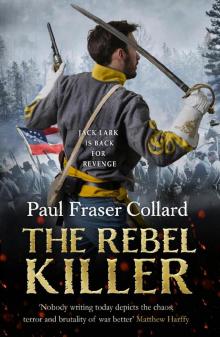 THE REBEL KILLER
THE REBEL KILLER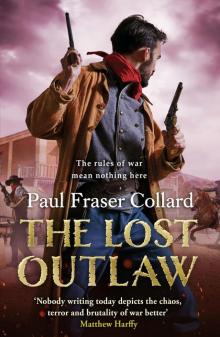 The Lost Outlaw
The Lost Outlaw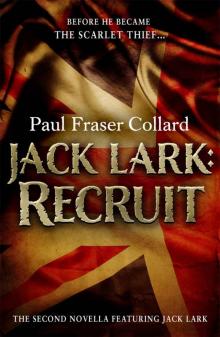 Jack Lark: Recruit (A Jack Lark Short Story)
Jack Lark: Recruit (A Jack Lark Short Story)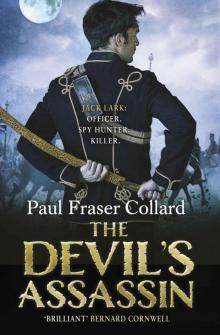 The Devil's Assassin (Jack Lark)
The Devil's Assassin (Jack Lark)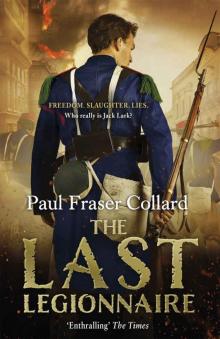 The Last Legionnaire
The Last Legionnaire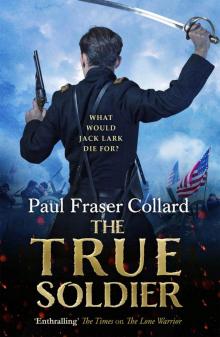 The True Soldier: Jack Lark 6
The True Soldier: Jack Lark 6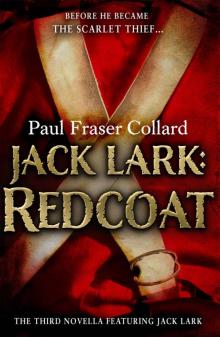 Jack Lark: Redcoat (A Jack Lark Short Story)
Jack Lark: Redcoat (A Jack Lark Short Story)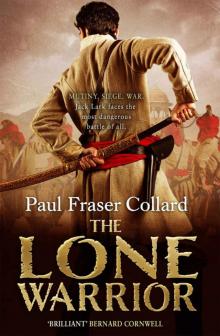 The Lone Warrior
The Lone Warrior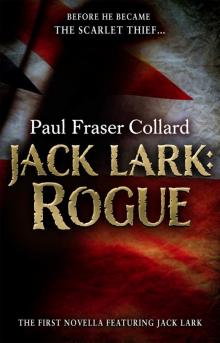 Jack Lark: Rogue
Jack Lark: Rogue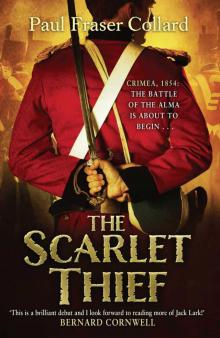 The Scarlet Thief
The Scarlet Thief